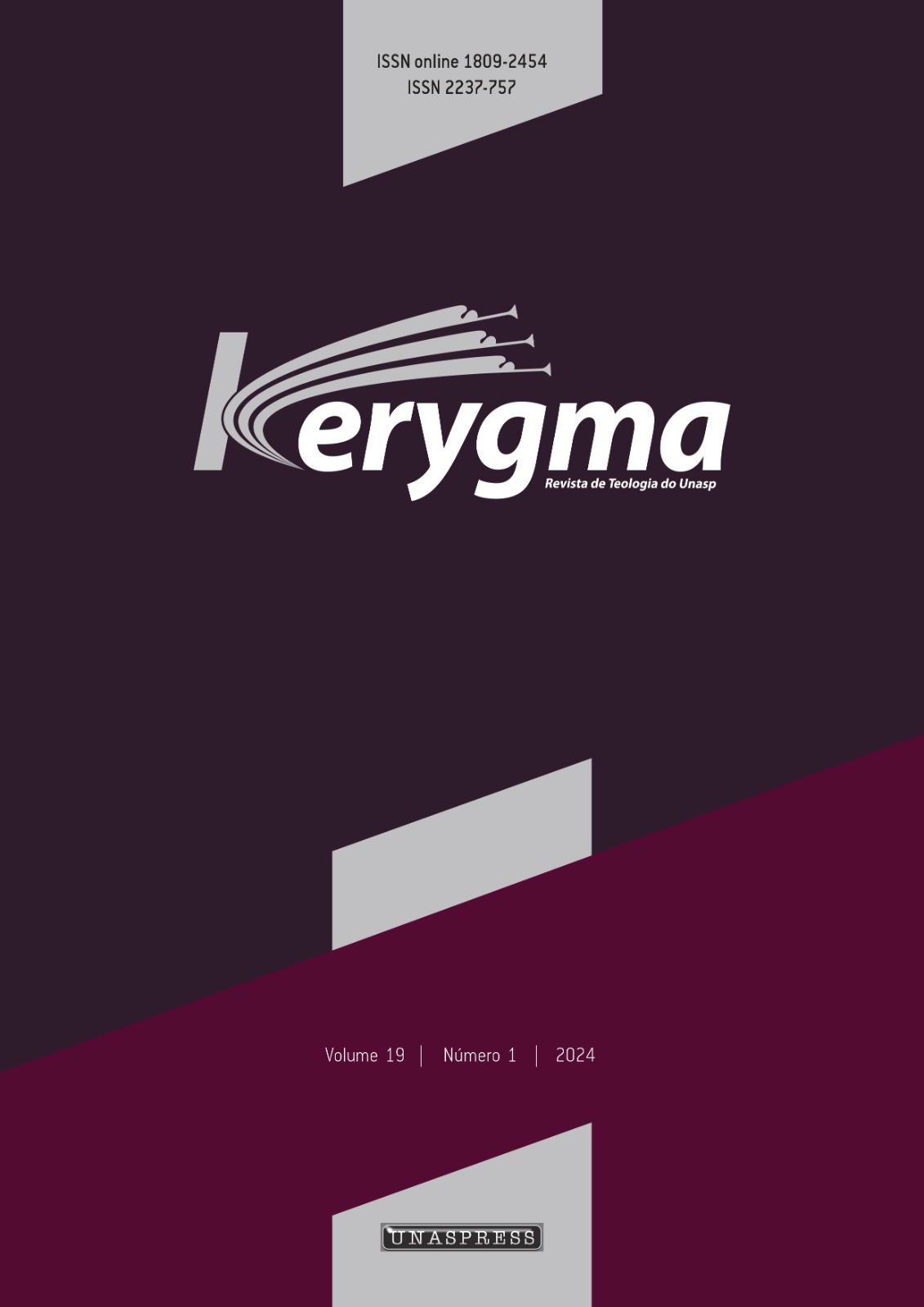As fontes bíblicas utilizadas por William Shakespeare em Hamlet
DOI:
https://doi.org/10.19141/1809-2454.kerygma.v19.n1.pe1643Palavras-chave:
Bíblia, Hamlet, William ShakespeareResumo
O objetivo desse artigo é apresentar as fontes bíblicas utilizadas por William Shakespeare em sua famosa tragédia Hamlet. Para tanto, fez-se uma análise do contexto histórico e religioso da Inglaterra em que ele viveu e escreveu sua peça. Apesar de Shakespeare ter feito uso de fontes bíblicas em várias de suas obras, é em Hamlet que isso mais se destaca. Nesse estudo foram identificadas vinte e uma referências de versos bíblicos na tragédia do jovem príncipe da Dinamarca, que corroboram os temas principais da peça, como o fratricídio, a vingança e a transitoriedade da vida. Assim, verifica-se que Shakespeare, por meio dessas alusões bíblicas, não apenas enriqueceu a narrativa de Hamlet como também ofereceu uma visão profunda e atemporal das questões existenciais e morais tratadas na obra, permitindo uma reflexão sobre a interação entre literatura, espiritualidade e os contextos religiosos de sua época.
Downloads
Referências
AMORA, M. Hamlet: a difícil arte de decidir. São Paulo: Novo Século, 2006.
BAKHTIN, M. Estética da criação verbal. 2. ed. São Paulo: Martins Fontes, 1997. (Coleção Ensino Superior).
BARROS, D; FIORIN, J. (Org.). Dialogismo, polifonia, intertextualidade: em torno de Bakhtin. São Paulo: Edusp, 1999.
BLOOM, H. Shakespeare: a invenção do humano. Rio de Janeiro: Objetiva, 2000.
BRYSON, B. Shakespeare, o mundo é um palco: uma biografia. São Paulo: Companhia das Letras, 2008.
DAVIS, J. Novo dicionário da Bíblia. São Paulo: Hagnos, 2005.
DORNELES, V. (ed.). Comentário bíblico Adventista do Sétimo Dia. Tatuí: Casa Publicadora Brasileira, 2011. (Série Logos, v. 1)
DORNELES, V. (ed.). Comentário bíblico Adventista do Sétimo Dia. Tatuí: Casa Publicadora Brasileira, 2014. (Série Logos, v. 6)
GENETTE, G. Palimpsestos: a literatura de segunda mão. Belo Horizonte: Faculdade de Letras, 2006.
GREENBLATT, S. Como Shakespeare se tornou Shakespeare. São Paulo: Companhia das Letras, 2011.
HELIODORA, B. Reflexões shakespearianas. Rio de Janeiro: Lacerda, 2004.
HILL, C. A Bíblia inglesa e as revoluções do século XVII. Rio de Janeiro: Civilização Brasileira, 2003.
HONAN, P. Shakespeare: uma vida. São Paulo: Companhia das Letras, 2001.
KRISTEVA, J. Introdução à semanálise. 2. ed. São Paulo: Perspectiva, 2005.
KOCH, I.; TRAVAGLIA, L. A coerência textual. São Paulo: Contexto, 1990.
MILWARD, P. Biblical influences in Shakespeare’s great tragedies. Bloomington: Indiana University Press, 1987.
OLIVEIRA, A. A maldição primeira e outros intertextos bíblicos em Hamlet, de Shakespeare. Revista Estudos Anglo-Americanos, nº 42, p. 123-142, 2014. Disponível em: https://ojs.sites.ufsc.br/index.php/reaa/article/view/1537. Acesso em: 01 jul. 2024.
PFANDL, G. (org.) Interpretando as Escrituras. Tatuí: Casa Publicadora Brasileira, 2015.
RIBEIRO, F. Tributo a William Shakespeare: os 460 anos de nascimento de um grande poeta e dramaturgo. Cordis, n. 31, p. 1-12, 2024. Disponível em: https://doi.org/10.23925/2176-4174.v1.2024e66947. Acesso em: 12 jul. 2024.
ROCHA, R. O jogo político na era dos Tudors: absolutismo e reforma. In: LEÃO, Liana; SANTOS, Marlene (orgs.). Shakespeare, sua época e sua obra. Curitiba: Beatrice, 2008. p. 32-61.
SHAHEEN, N. Biblical references in Shakespeare’s plays. Newark, DE: University of Delaware Press, 2011.
SMITH, Emma. Guia Cambridge de Shakespeare. Porto Alegre: L & PM, 2014.
WOLF, A. A intertextualidade fílmica e a linguagem cinematográfica: Woody Allen versus Ingmar Bergman. In: CONGRESSO DE CIÊNCIAS DA COMUNICAÇÃO NA REGIÃO SUL, 16., 2015, Joinville. Anais […]. São Paulo: Intercom, 2015. p. 1-12.
Downloads
Publicado
Como Citar
Edição
Seção
Licença
Copyright (c) 2025 Kerygma

Este trabalho está licenciado sob uma licença Creative Commons Attribution 4.0 International License.
Declaração de direitos autorais
Em síntese, autores que publicam na Kerygma devem concordar que:
-
Após a aceitação, os direitos autorais dos artigos são transferidos à Kerygma.
-
Todo material de terceiros utilizado no texto deve estar corretamente referenciado.
-
Os autores devem possuir autorização para uso de imagens, tabelas e demais materiais gráficos.
-
Os autores asseguram que o texto é original, de sua autoria, e não foi submetido ou publicado em outro veículo.
-
As ideias e opiniões expressas são de responsabilidade exclusiva dos autores, não refletindo necessariamente a posição da revista.
-
Os editores reservam-se o direito de realizar ajustes textuais e adequações às normas editoriais.
-
Os autores mantêm os direitos autorais e concedem à revista o direito de primeira publicação, sob licença Creative Commons Atribuição–Não Comercial 4.0 Internacional.
-
Os autores autorizam a reprodução e adaptação do material pela Kerygma, mediante participação ou autorização expressa quando necessário.
-
A revista poderá distribuir, armazenar, arquivar e disponibilizar os artigos por quaisquer meios físicos ou digitais, gratuitos ou pagos.
-
Os autores podem firmar contratos adicionais para distribuição não exclusiva do trabalho, com menção à publicação original na Kerygma.
-
A reprodução integral ou parcial dos textos em outros meios requer autorização prévia e escrita do editor.
-
Os autores são autorizados e incentivados a divulgar seus trabalhos online antes ou durante o processo editorial, visando ampliar seu impacto acadêmico.














